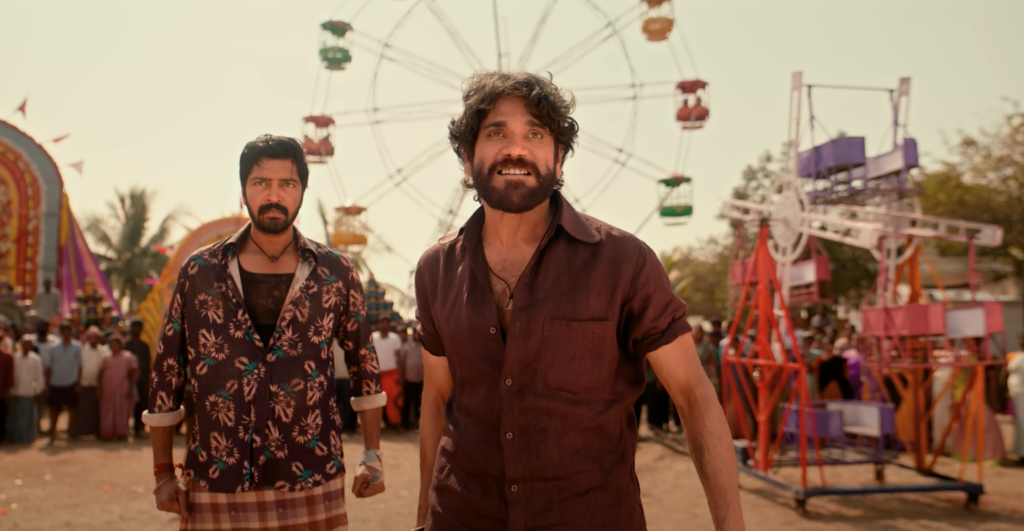Telugu Movie Review: Naa Saami Ranga is an electric cocktail of family and village drama, propelled by Nagarjuna’s charisma

Shakespearean family drama abound in Naa Saami Ranga, though that’s not to say the film ever becomes unbearably tragic. Don’t get me wrong, there are some incredibly intense plot developments, as well as some devastating fates that characters would certainly have preferred not to have suffered. But at its essence, this is an energetic, pleasurable spectacle – a play on Shakespearean character dynamics that doesn’t necessarily carry the same tone over. It’s very early in the year yet, but for now, Naa Saami Ranga stands out as the most consistently entertaining attempt at a “mass appeal” film in 2024.
The directorial debut of longtime choreographer Vijay Binni, the film is brimming with musicality – and not just in the solid song-and-dance numbers. Even the most dialogue-heavy scenes carry a certain propulsive energy to them, which feels like a direct byproduct of Binni’s extensive experience in staging and presenting Tollywood stars. Sometimes, a movie just feels and moves differently than most of the other films in the marketplace, and it’s hard to put your finger on exactly why. Na Saami Ranga fits this description, and the credit goes to Binni.
The story, adapted from the 2019 Malayalam film Porinju Mariam Jose (which I have not seen), centers on two adoptive brothers. As a child in the ‘60s, orphan Kishtaiah (played as an adult by Nagarjuna) was taken in by the mother of Anji (played as an adult by Allari Naresh). Mom’s untimely death bonded the two boys for life, and they remain under one roof into adulthood with the help of village leader Peddayya (played by Nassar). That may sound perfectly heartwarming, but Naa Saami Ranga is far from a film about harmonious family dynamics.
After the brief childhood prologue, we meet up with Kishtaiah and Anji still together as adults in 1988, with some subsequent flashbacks to 1978. The brothers – Kishtaiah in particular – serve as guardians for the town, out of their unrepayable debt to Peddayya for keeping them housed, fed, and safe as they grew up. This places them at the center of two major conflicts. The first is with the rival village, run by Veerabhadrudu (Madhusudhan Rao), which they have long had (very violent, very physical) battles with, but a recent intra-village romance has brought the tensions to a head. The second is with Peddayya’s biological son Dasu (played by Shabeer Kallarakkal), an ex-convict with a rap sheet including attempted murder who never accepted Kishtaiah being welcomed into the family.
You would be right to assume that the frictions between family members, families, and villages escalate into dramatic action set-pieces. These are never particularly massive in scope/scale – after all, Naa Saami Ranga is largely set in one small village in Northern Andhra Pradesh – but they feel big because they are well-staged, well-shot, and grounded in characters who are easy to invest in. In fact, the climactic action sequences in the film have such a captivating style, with such well-constructed stakes and impactful violence, it’s often hard to believe they are the work of a first-time director, regardless of Binni’s other film credits.
I would be remiss, however, if I didn’t also credit Nagarjuna with much of the film’s success. While his performance as Kishtaiah isn’t particularly “deep,” Nagarjuna is able to shorthand Kishtaiah’s devotion to both Anji and Peddayya in deceptively sophisticated ways, always keeping the viewer tuned into the stakes for his character. He also has incredible raw charisma – so much that most viewers won’t even recognize the fact that this 64-year-old actor is playing a character who is at most 40. (I sent several friends who don’t watch Indian films screenshots from the trailer and asked them to guess his age, and none of them pegged him as a day over 44.) This is one of those performances that remind us that the Indian film industry currently has far bigger, more commanding movie stars than Hollywood; you can’t take your eyes off him.
The film is less successful in the romance department. Kishtaiah spends a sizable portion of the running time trying to convince his crush-since-childhood Varalu (played by Ashika Ranganath) to marry him, but despite her reciprocal attraction, more family drama gets in the way. Kishtaiah and Anji have a somewhat conflict-laden past with Varalu’s father (played by Rao Ramesh), but what we learn about this early in the film is only the tip of the iceberg. There are a number of shocking revelations in this department, but these only seem to draw attention to the fact that the romance between Kishtaiah and Varalu doesn’t sizzle nearly as much as other elements in the movie do. Especially given how charismatic Nagarjuna is in this role, you would expect the love story to be a driving force of the film’s appeal, not a hindrance.
It also feels like the script, at times, could do a better job of fleshing out the motivations of members of the supporting cast, particularly the three biological sons in Peddayya’s family. All too often, the film relies on the audience’s acceptance of simple tropes when it comes to the various conflicts – i.e., of course Peddayya’s sons would feel slighted by his fatherly attitude towards Kishtaiah and Anji. But the movie would be richer if it found more nuanced ways to chart the same course. The same goes for the history between the two embattled villages; this rift makes logical sense as presented, but it lacks the level of complexity required to really elevate the material beyond simply that of a broad entertainment.
But you can do a lot worse than a successful broad entertainment, and I suspect that Naa Saami Ranga will leave most viewers looking for a straight-ahead village action-drama quite satisfied. Even if the substance of the movie strikes you as a little thin, it’s hard not to embrace Nagarjuna and the overall tone of the picture, not to mention the dynamic songs. If I knew how to speak Telugu, I’d definitely be giving karaoke performances of the title track to anyone who would listen. Alas, the world will have to settle for the genuine article in the film itself, which is surely far more enjoyable than my singing voice could ever be.

